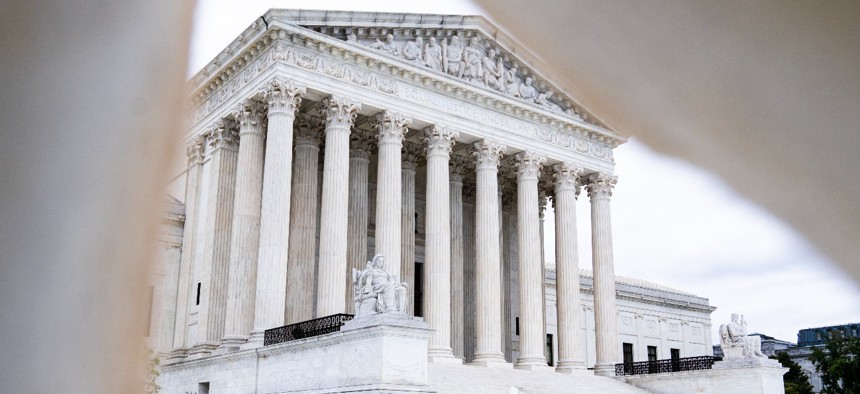
“I guess with this Supreme Court, no prior decision and no prior precedent is final, and anything can be challenged,” one observer said. Tom Williams/CQ-Roll Call, Inc via Getty Images
Supreme Court Takes Up Case Challenging FLRA's Long-Settled Jurisdiction Over National Guard Civilians
If the court’s conservative majority throws out the long-standing precedent that state national guards must comply with federal sector labor law, more than 20,000 employees could lose their collective bargaining rights.
The Supreme Court appears poised to overturn nearly 40 years of precedent, as it announced Monday it will take up a case challenging the Federal Labor Relations Authority’s jurisdiction to compel states to provide federal sector collective bargaining rights to civilian employees of state national guards.
The court on Monday granted certiorari to the Ohio Adjutant General’s Department v. Federal Labor Relations Authority, meaning at least four justices agreed to review the case. At issue is the question of whether the 1978 Civil Service Reform Act empowers the FLRA to regulate the labor practices of state militias.
State national guards employ a cadre of technicians, who are civilian federal employees who work in a variety of clerical, administrative and technical roles to support the National Guard’s operations. Under Title 10 of the United States Code, which governs the armed forces, these employees are called “dual status technicians” because although they are employed by states and hold a military grade, they also are afforded the benefits and rights provided to federal employees.
As such, courts have consistently held, dating as far back as 1983, that they are federal employees for the purposes of federal labor law, and that states must allow them to bargain collectively and negotiate in good faith with their unions, just like federal agencies do with their bargaining units.
In the Ohio case, the state’s union contract with the American Federation of Government Employees expired in 2014, and although the state committed to continue to bargain in good faith with the union on a successor agreement, in 2016 it distributed a memo saying that the state is neither bound by the expired contract nor the Civil Service Reform Act. The state then proceeded to cancel union dues payroll deductions from “most” dues-paying members, prompting a series of unfair labor practice complaints that were upheld by the FLRA in 2020.
Ohio appealed the FLRA’s decision to the U.S. Court of Appeals for the Sixth Circuit, where a three-judge panel ruled unanimously against the state. The 11-page decision cited voluminous other cases upholding the FLRA’s ability to regulate labor relations among state national guards, both in the Sixth Circuit and other courts of appeals, to support its conclusion.
“Every other circuit that has considered this issue has similarly found that state national guards constitute executive agencies in their capacity as employers and supervisors of technicians,” the judges wrote. “[If] we accepted the guard’s argument to the contrary, we would create a circuit split. And given the ‘unanimity of thought’ across the circuits on this issue, we are not inclined to do so.”
Robert Tobias, distinguished practitioner in residence at American University’s Key Leadership Program and a former president of the National Treasury Employees Union, said he was surprised the court would consider such a case where the judiciary has consistently come to the same conclusion: that guard technicians are federal employees for the purposes of federal labor law.
“I guess with this Supreme Court, no prior decision and no prior precedent is final, and anything can be challenged,” he said. “If there was ever unanimity of circuit courts of appeal on an issue, it’s certainly this case.”
Given the unusual circumstances surrounding this case’s ascension to the nation’s highest court, Tobias said he was not optimistic that the four-decade-long precedent would be upheld.
“It could be a very big deal,” he said. “This court this session is reconsidering a vast range of precedents. Why else would it grant review if it wasn’t of a mind to overturn what every circuit who has considered this issue in the past has found: that collective bargaining for these folks is appropriate.”
A decision overturning the FLRA’s jurisdiction could affect the more than 20,000 members of state national guards who belong to a bargaining unit, per Office of Personnel Management data as of June of this year.
“Any employer can voluntarily do whatever they want, but my belief would be that they would all renounce their [collective bargaining agreements] and that they would end,” Tobias said. “The labor-management relationship would end, just as [Ohio] did in 2014. It would surprise me if any national guard continued these labor-management relationships.”







